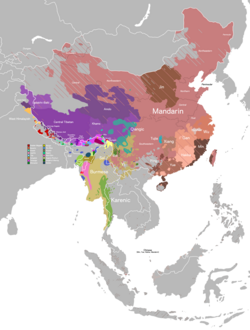The Yongzhou dialect (Chinese: 永州话; pinyin: Yǒngzhōuhuà) is a dialect of Xiang Chinese spoken in Yongzhou, Hunan Province.
Origin and Development
Before the Han Dynasty, Yongzhou was entirely a residential area for ancient indigenous ethnic groups such as the Yao people. There are still many of their descendants in the upper reaches of Xiao River today.[1]
The population of the Yao people decreased greatly after the Han Dynasty, which may be due to the assimilation of the Yao people as a result of the large number of Han people migrating southward. When Liu Zongyuan came to Yongzhou in the Tang Dynasty, he said that the people here spoke very strangely and could not understand him at all. However, after a few years, his accent became the same as that of the locals in Yongzhou. Apparently people here switched to speaking Chinese during the Tang Dynasty, but the accent and vocabulary were quite special. Perhaps this is the origin of the modern Yongzhou dialect.[2]
Then, many people from central and eastern Hunan moved into Yongzhou, making the Yongzhou dialect more biased towards Xiang dialect. During the Ming and Qing Dynasties, a large number of people from Jiangxi immigrated, and Gan dialect also had an influence on Yongzhou dialect. For example, "dàng" is said in "here", which is consistent with the Taihe dialect in Jiangxi. In modern times, Yongzhou dialect has been greatly influenced by Southwest Mandarin and Standard Chinese (Beijing Mandarin).[3]
References
- ^ "瑶文化_瑶文化_永州政府网". www.yzcity.gov.cn. Retrieved 2023-11-11.
- ^ "千万孤独:柳宗元的贬谪岁月 | 草地副刊". 知乎专栏 (in Chinese). Retrieved 2023-11-12.
柳宗元到了永州后发现,"楚、越间声音特异,鴂舌啅噪",当地人的方言,压根儿就不知道在说什么。当然,令柳宗元感慨万千的是,他没想到在永州一住十年,到了后来,原本一头雾水的永州方言,不仅听得懂,甚至还能说几句,以至发出"听之怡然不怪,已与为类矣"的感慨。
- ^ "为何湖南南部与江西南部会出现西南官话方言岛? - 知乎". www.zhihu.com. Retrieved 2023-11-11.

